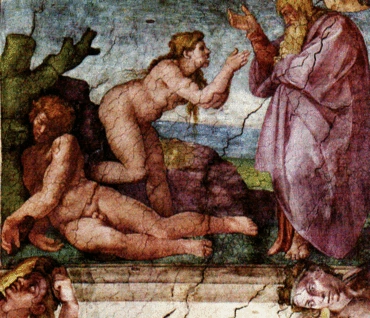Explanation of Genesis 2:23
By Brian David

The celestial people of the Most Ancient Church, motivated by the love of the Lord, were in a constant state of sensing the separation between their internals and their externals. They could be externally involved with the necessities of life – gathering and preparing food, caring for children, caring for each other – while deep in their minds being constantly aware of the Lord, and of angels, and of the spiritual value of even the external things they were doing. But to give them the sense that life was their own, the Lord had to emphasize their externals and give them the leading role. So the people lost their constant awareness of spiritual things.
That is represented here. "Bone of my bones" means that the dead, hellish sense of self in external life was linked to the same thing in internal life. "Flesh of my flesh" means the living, heavenly sense of self in externals is also linked to internals. "Woman" means the sense of self as a complete state of life, and "man" – used in a specifically masculine sense here – means intellectual thoughts and concepts in the internal man. So at all levels, the external sense that life was their own took dominance in the people of the Most Ancient Church.
(References: Arcana Coelestia 156, 0157, 158, 159)
Arcana Coelestia #487
487. 'Days means periods of time and states in general. This has been shown in Chapter 1, where the 'days of creation' have no other meaning. In the Word it is very common for a whole period of time to be called 'a day', as it clearly is in the present verse and in verses 5, 8, 11, 14, 17, 20, 23, 27, 31, below; and therefore the states that belong to periods of time in general are meant by 'days' as well. And when 'years' is attached, then periods of years mean the natures of those states, and so the states in particular.
[2] The most ancient people had their own particular numbers which they would use to mean different aspects of the Church - for instance, the numbers three, seven, ten, twelve, and many which they obtained from these and other numbers - and in so doing incorporated states of the Church. These numbers therefore contain arcana that would require considerable effort to unravel. Really a number was an evaluation of the states of the Church. The same feature occurs throughout the Word, especially in the prophetical. And the religious ceremonies of the Jewish Church also entail numbers specifying periods of time as well as quantities; for example, in connection with sacrifices, minchahs, oblations, and other practices, which in every case have special reference to holy things. Consequently eight hundred in this verse, nine hundred and thirty in the next, and the numbers of years mentioned in the verses that follow after that, embody in particular more matters than can possibly be retold; matters, that is to say, which have to do with changes in the state of their Church in relationship to their own general state. Later on, in the Lord's Divine mercy, the meaning of the simple numbers up to twelve will be given, for without knowing these first of all no one can grasp what compound numbers mean.






